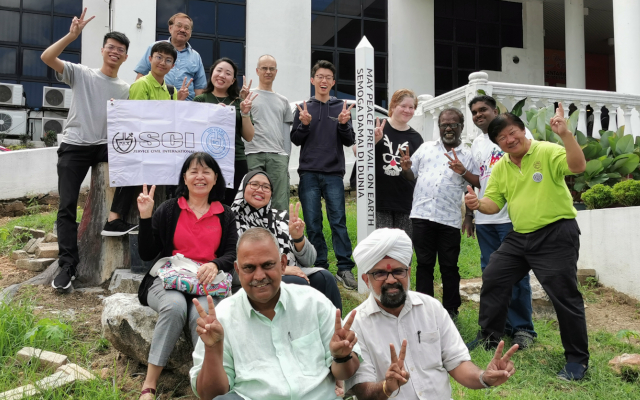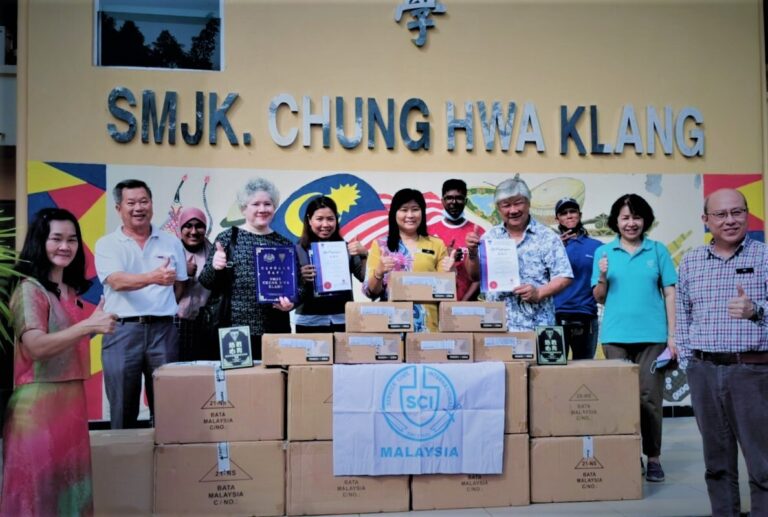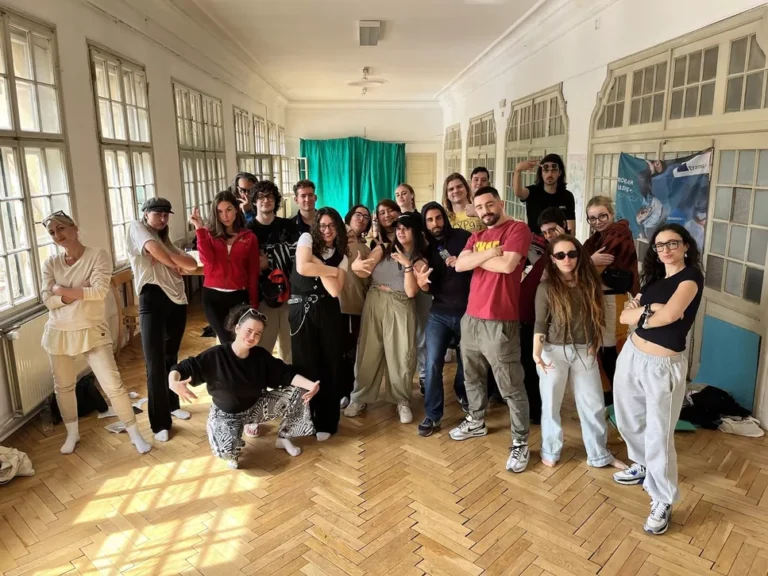SCI Workcamp in Glücksburg
Near the Danish border, on the Flensburg Fjord, is the most northern city in Germany our workcamp was located. Glücksburg is not only known for its magnificent castle or its location on the Baltic Sea, but also because of the fact that the first Power park in Germany is located there. So, actually, a well-known workcamp from SCI-Germany “Sun+Wind=Power?!” took place in this Power Park from 8nd to 22nd of August. The Center for Sustainable Development “Artefact”, our local partner, completely powered by renewable energies, provided the proper conditions for an unforgettable 2 weeks of living and working together.
The Centre for Sustainable Development runs a guest house built in adobe architecture and the Energy Adventure Park for youth and seminar groups, organises project days on global learning, and provides information on renewable energies, sustainable construction, and water supply. The buildings of the centre, which are completely supplied with renewable energies, the energy park as well as the nature experience space have to be renovated again and again and extended by new stations in order to remain attractive for visitors.
We were lucky to have a talk with Werner Kiwitt is CEO of Artefact, who told us many interesting facts about Artefact’s history. Since 1990 he has been a thought leader in energy issues and global learning ever since. So, Artefact operates the Centre as a meeting place for educational programmes and congresses with a futuristic infrastructure:
- Seminar and convention rooms constructed with materials that save energy and do justice to location specifications
- Living and common rooms in attractive international cobwork design
- Independent energy supply from renewable resources with modern solar-wind-biomass power plant
- Water resource savings techniques and ecological sewage purification
Let’s read our interview with Werner:
Back to the history: How the idea of workcamp in Artefact Power Park came to your mind and what was the main idea/goal of having it for many years?
The first SCI workcamp took place at artefact in 1987 already, when with US-Indian volunteers an ecological sewage plant was built at the site – years before I came here myself. Since I myself had joined many workcamps worldwide. I was happy to have the opportunity to later establish yearly summer workcamps at artefact.
Why is it important to have such initiatives as workcamps, especially, for global justice/peace promotion?
In the Nineties, the younger generation took the absence of war and of other serious conflicts at least in Europe for granted. But democracy and peace have to be lived, developed, and defended continuously. Therefore, the idea of exchange and conciliation through workcamps today is as important as 100 years ago.
Workcamp 2020 in Artefact – how did you like it and what was the input of volunteers?
This year´s workcamp was special: the mix of generations (from 18 to 60 years), exchange of experiences, of motivation to focus on challenges more threatening than corona – and nevertheless having fun and achieving real results with volunteer work.
What ideas for the nearest future do you have in your mind and would you like to implement for further development of Artefact?
We want to focus on our education and infotainment work even more on the climate crises – and the responsibility and opportunities we have in these years by showing the tremendous chances decentralized renewable energies can provide for global peace and justice. Therefore we want to change the “Powerpark” in the next year to “climate park: every day for the future!”
Artefact for me is…
a wonderful platform to show how intercultural exchange can motivate and capacitate people to join hands for safeguarding this fascinating but highly vulnerable planet… and the spirit and drive of every workcamp is a mutual inspiration and motivation to keep up struggling for it.
All in all, 8 volunteers from Germany, Switzerland, the Netherlands, Belgium, France, Romania, and Finland and 2 Campleaders carried out a variety of work tasks. Among them: checking solar systems and making repairs (for example, we repaired a windmill and were able to put a water pump back into operation); planting and gardening around the power park. As an outcome, the volunteers built Insects hotel. The study part included such topics as vegetarian food diet and climate change, stereotypes, the concept of culture, racism, and homophobia.
This year SCI-Germany initiated digital networking via zoom meetings with a parallel workcamp in Finland to promote international exchange. Leisure time remembered with a variety of team games, meditating together, dancing, yoga, improvisation theater workshops, campfire evenings, excursions, initiated mostly by volunteers. At the weekend we went by boat to Flensburg, visited the castle of Glücksburg, explored the Holnis peninsula by bike, and visited the northernmost point of the German Baltic coast. The group spirit was so strong so we even created a cookbook with recipes of dishes (including unique masterpieces from our volunteers as Finnish Karelian pies, Belgian Gateau au Chocolat, Swiss macaroni from the Alps, and Dutch/Indonesian Nasi Goreng) cooked during these two weeks.
Here you can read feedback from our volunteers:
I feel enriched by the whole experience, leaving the camp, way happier than I arrived. The whole group was fantastic, all special and complex in their own way. They, together with the work we did and the time we enjoyed with each other, makes me feel like I have to leave HOME in order to go home and I am incredibly grateful for how desperately sad I am that this is coming to an end. Glücksburg meant “walking bare feet” in every possible way and I think the self (Estera) they got to meet was more authentic than ever before! I “blame” SCI for it all, may you enable this for many more!
Estera, 25, Romania
I think that these types of work camps represent an incredible opportunity to broaden your way of thinking. These types of projects might be one of the best ways to create real connections between individuals with different backgrounds. Workcamps bring people together as they all come to work on a common project.
Anonymus
The workcamp in Glücksburg was the first workcamp I coordinated offline. To say for truth, it exceeded all my expectations: helpful co-camp leader, motivated volunteers, picturesque location, and the well-organized project itself made these 2 weeks absolutely outstanding! I am blessed and wish all the people to gain such experience which inspires you to keep doing volunteering for peace.
Nataliia Beketova, Campleader (LTV, Outgoing Placement Officer in SCI-Germany’s office)
 I hope that you are inspired enough for taking part in such initiatives as workcamps. The list of SCI workcamps worldwide you can find there https://workcamps.sci.ngo/icamps/camps. Huge thanks to all the volunteers and let’s make our world better together!
I hope that you are inspired enough for taking part in such initiatives as workcamps. The list of SCI workcamps worldwide you can find there https://workcamps.sci.ngo/icamps/camps. Huge thanks to all the volunteers and let’s make our world better together!
The reportage was written in cooperation with my Co-Campcoordinator Dorothea Zimmer.






